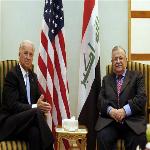08 July 2010

Photo: AP
US Vice President Joe Biden (l) meets with Iraqi President Jalal Talabani in Baghdad, 05 Jul 2010
U.S. Vice President Joe Biden held talks with Prime Minister Nouri al-Malaki, and former Prime Minister Ayad Allawi, whose secular Iraqiya party narrowly defeated Mr. Malaki's Shi'ite State of Law alliance. Mr. Biden also met with President Jalal Talbani, a Kurd. The vice president stressed that Washington takes no side in the dispute over who should lead Iraq.
"I remain as I have from the beginning, extremely optimistic about a government formed here that will be representative, represent all the major parties," said Vice President Joe Biden.
Ahmed Ali, an Iraq analyst at the Washington Institute for Near East Policy in Washington, agrees the U.S. wants to remain neutral.
"The administration has decided since the beginning of the elections not to dictate any terms to the Iraq politicians and Iraq political parties," said Ahmed Ali.
Since the parliamentary election in March, both Prime Minister Malaki and Mr. Allawi have insisted they should head the next government.? Charles Dunne, an Iraq expert at the Middle East Institute in Washington, says Vice President Biden is helping push the political process along.
"I think the politics in the past couple of weeks, especially the last week, even during the Biden visit, have become a little bit more fluid," said? Charles Dunne. "You've seen several series of talks between Malaki and Allawi. And I think we start to see some progress being made in at least the next month."
Iraqi militant Shi'ite cleric Moqtada al-Sadr has called on Iraqi leaders not to be swayed by the United States. Dunne, on the contrary, says he thinks most Iraqis want to see a higher level of U.S. engagement in the political process.
"I've been told by senior Iraqi officials that anyone who wants to become prime minister in Iraq today wants to be the American candidate," he said. "Nobody will say that in public because of political reasons, but that is what is reflected, I think, in their eagerness to meet with Biden and the welcome that he received for his efforts in coming to Iraq."
Biden stressed that progress on forming a government could only be made if Iraqi leaders focus on the national interest. He said Iraqi political leaders must have all major political blocs proportionally represented in the new government for it to work. Dunne disagrees.
"I am not in favor of a proportional representation system that creates, in effect, a national unity government that is really only a recipe for dysfunction," said Dunne. "I think there are some parties that don't necessarily need to be represented in the government, and certainly some that should not have control of key ministries."
During Biden's visit more violence occurred in Iraq. Ahmed Ali says insurgents, especially those with connections to al-Qaida in Iraq, are taking advantage of the lull in the government.
"The type of violence has changed," he said. "It has turned mostly into assassination attempts and assassinations against political candidates and religious figures. That's the most worrisome about the current violence, is it could trigger a reaction from one group against another group."
Analysts and some Iraqi lawmakers say it still could be months before a new government is put into place in Iraq.
But U.S. officials would like that to happen sooner, before more American military troops leave Iraq by the end of August, leaving 50,000 troops in an advisory role.